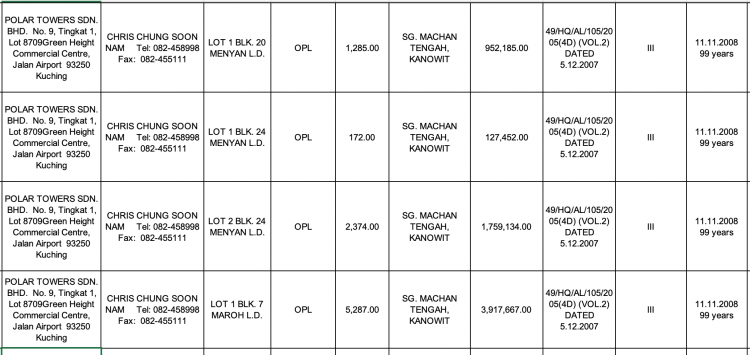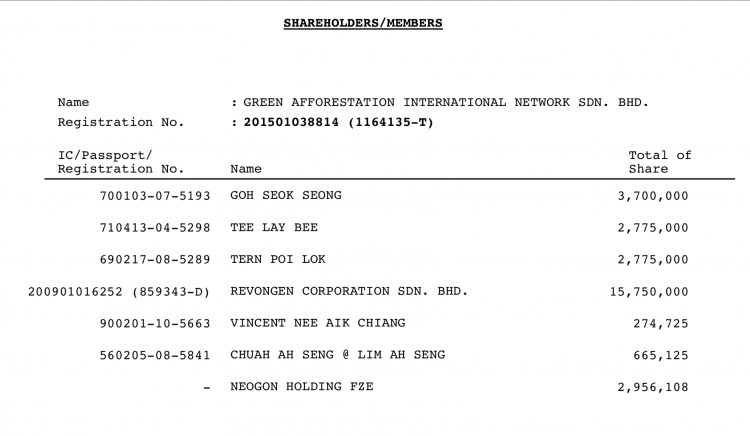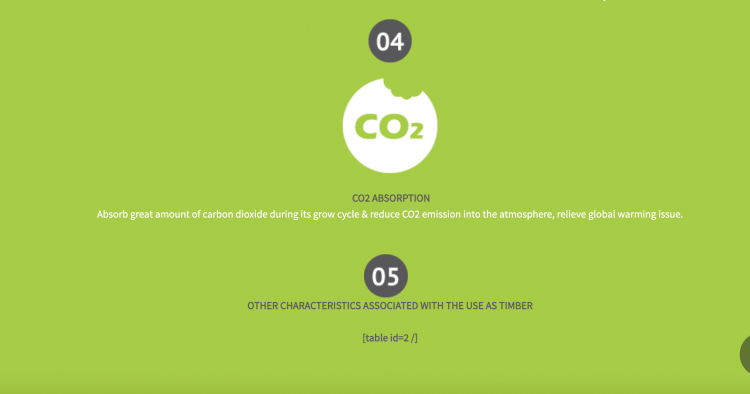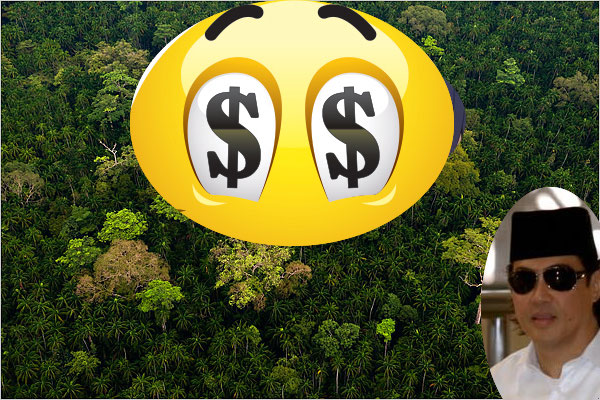Abu Bekir’s previous known attempt to log out Sarawak lands, corruptly handed to him by his father for a pepper corn rate, bordered the Mulu World Heritage site using his company Radiant Lagoon. The process was suspended (following much destruction) after an international and local outcry.
No one will be surprised that it has now emerged that the greedy inheritor of so much stolen wealth is now seeking to cash in another of the huge parcels of land given to him practically for free back in 2008 (part of a highly dubious ‘compensation deal’ in the wake of a failed massive bridge building contract gifted by his Dad).
Sarawak Report has identified his latest project, this time under the company Polar Towers, which (like a score of similar outfits holding further land gifts) is registered under the ownership of his long term business partner Chris Chung and based at Abu Bekir’s own Titanium Management headquarters in Kuching.
Polar Towers has a 99 year lease over some 10 thousand hectares, much of which comprises valuable secondary forest in the Ulu Machan area in Kanowit, according to locals. The premium charged (no one can be sure it was paid) was a paltry RM7 million.
That amounts to around just RM700 a hectare of land which, according to the Land Register, Abu Bekir was supposed to convert to oil palm but plainly has not yet done so (experts say it is steep and unsuitable).

“Growing Millions of Trees”
Sarawak Report has learnt the company has recently gained lucrative approval from the Forestry Department to clear fell the area in pursuit of an “Industrial Tree Plantation Project”. It is the sort of venture that is being all too readily described by proponents as a climate friendly activity or ‘eco-project’.
Don’t be fooled, since this is about greedy logging first and foremost and then the proposed planting of an experimental, artificial quick-cash crop which will destroy the natural environment and drive global warming.
The Sarawak State Government like others has started jumping on the fake green bandwagon over recent months, having for decades acted as a prime culprit in driving global warming by chopping down vast swathes of the world’s third largest jungle and replacing it with a carbon generating monoculture, namely palm oil
In the latest official declaration last month the chief minister boasted plans to grow “35 million trees in five years” – which sounds a lot, but isn’t. One natural tropical forest hectare contains up to 2,500 trees, meaning this pledge only aspires to cover some 14 thousand hectares – that’s the size of an average logging or plantation concession in Sarawak (Abu Bekir was awarded at least 50 thousand hectares under the Titanium Management deal alone).
Furthermore, forestry experts monitoring Sarawak’s efforts say there has been very little information or transparency detailing what trees are to be grown and where. One forestry expert warned Sarawak Report that the lack of detail makes it likely the projects are far from eco-friendly:
“If by ‘growing trees’ they mean they plan to cut down native forests and replace them with fast-grow, cash crop, monoculture plantations (most of which have previously failed in Sarawak) then they are doing huge further environmental damage to the jungle and creating rather than countering global warming and climate change.
These plantations further involve the constant cutting of trees which re-releases rather than captures carbon. Worse they are monocultures using imported rather than indigenous species which require pesticides and fertilisers, all of which destroys the natural landscape and kills wildlife. It becomes a desert for other species and usually the imported trees prove unsuitable and die also. Across Sarawak there are vast Acacia plantations that have already proven a disaster and have simply been abandoned”
New Genetically Modified Paulawnia Plantation Plan!
Sarawak Report has gained further information about the Abu Bekir project. Not only does he plan to rip out the natural trees in the area and replace them with an “Industrial Plantation” but he plans to use an experimental tree cloned from a genetically altered species with the sole greedy ambition of achieving the fastest growing tree on earth – the ultimate quick cash crop.
The Malaysian company Revongen Corporation behind the project is operating under a company called Green Afforestation International Network Sdn Bhd, a name which most environmentalists would consider misleading given that mass, quick growth plantations are not environmentally friendly.

Equally troubling is the fact that the tree that is being genetically modified by Revongen is yet another foreign imported fast grow species that is not natural to the region, namely Paulownia originally from Southern China.
Paulownia is not congenial to tropical areas as it is not adapted to heavy rains, therefore it is not part of Borneo’s naturally developed and highly sensitive ecosystem of plants and animals which all live harmoniously off the other. However, the tree is known to grow extremely quickly, which is clearly all the cash-crazed, already fantastically rich Taib family and their partners care about.
The company’s ‘Gain Green‘ website details the development of their genetically modified clone with the purpose of adapting it to Malaysia and the added ambition of making it faster growing still. The company boasts its ‘wonder product’ can produce a tree ready for harvest within 4-6 years compared to the normal Paulownia tree which takes up to 25 years to mature. So much more money faster.
However, the website also advertises that its four existing experimental plantation projects are located in West Malaysia only and have only been in development over the past four years. They are also far smaller than the planned Taib venture for Sarawak: they include a 100 acre (50 ha) project in Negeri Sembilan and an incomplete 4,000 acre plot in Kelantan.
Forestry experts have warned Sarawak Report that a tree that grows in West Malaysia may not thrive in the different environment of Sarawak. They also warn against rolling out a vast plantation of such an untested species which could very well result in yet another huge area becoming severely damaged by a failed experiment – like nearly all Sarawak’s enormous Acacia plantations which have all but been abandoned by the Taib family and cronies who were awarded vast lands to grow them.
In summary, in this case in Kanowit planting an industrial plantation will not “Gain Green” rather it will destroy natural forest in favour of a dubious industrial agri-project.
Yet, despite the major implications of the proposal and the need for public consultation, Sarawak Report has learnt that Abu Bekir’s well connected company has already quietly achieved a rapid approval from the relevant authorities in the state.
A document submitted to Sarawak Forestry has been sighted by Sarawak Report in which Polar Towers says it submitted a licence application in May, pending the necessary Environmental Impact Assessment (EIA) approvals:
“Polar Towers is planning to plant industrial trees on a large scale basis at Ulu Sg Machan-Sg Poi-Sg Ngemah area in the Sibu Division. The chosen species for the current Project is the RevoTropix Paulownia. This is a modified Paulownia species that has better growth in tropical countries like Malaysia. The proposed forest plantations will be developed on six blocks of lands, with a gross area of 10,775ha. They would be regarded as the “Polar Towers Tree Plantation” or the “Project Sites…. The proponent submitted the Tree Planting Plan and the application for a Licence for Planted Forest to the Forest Department, Sarawak on 18th May 2020.
The development of the tree plantation with a gross area of approximately 10,775 ha is classified as a prescribed activity .. which requires the submission of an Environmental Impact Assessment (EIA) report to the Natural Resources and Environment Board Sarawak for approval”
Despite this approval now apparently having been granted, locals from the area (who have the legal right to be fully informed) have told Sarawak Report they have received little or no information about what Polar Towers is planning for their forest.
Residents confirmed to SR that they are aware the company has started to be active in the area and has begun canvassing certain of the local villages, seeking they say to excite enough people to accept the project, whilst leaving others in the dark. This is a familiar tactic and of course it conflicts with the actual requirements of an EIA, which demands full and informed consultation of affected people.
“People don’t really understand what it is Polar Towers is going to do with the area, although it seems they are creating a new log pond and are planning to cut down trees. They are trying to tell some of the local people there will be opportunities for them if they agree”
one local area representative has explained to Sarawak Report.
What the resident had not been informed was that because this is a plantation project the entire area is due to be clear-felled, enabling Abu Bekir and his friends to profit mightily from extracting the lucrative timber of the secondary natural forest.
Having lost their natural foraging areas the local people will then find the land will be completely cleared and levelled before they become surrounded by a massive monoculture project. The Taib family will have already realised an easy profit from the logging. Their gamble is that this latest “wonder crop” will grow 3o times faster than other trees will be icing on the cake.
However the impact on the region and local people cannot be under-estimated. Not only will the plantation wipe out yet another area of living forest and turn it into agricultural desert with no other plant, animal or bird life, it will pollute the landscape and the water table with the herbicides, pesticides and fertilisers which are all used to protect a foreign species and promote fast growth.
The description of “green growth” could hardly be further from the truth and according to concerned environmental experts plantations also hugely contribute to global warming.

Although promotion on the project’s Gain Green website claims the fast growing trees absorb carbon quickly, the truth is far more complex.
Firstly, to grow the plantation the natural forest in this case has to be felled and the land cleared, causing major carbon releases. Secondly, the crop itself is only being grown in order to fell it as quickly as possible, once again releasing much of the briefly captured carbon. The turning of the earth and wide scale burning and composting throughout this process creates further immense carbon release.
On top of this the company is seeking to introduce a virtually untested foreign and genetically modified tree about which nothing is properly known, according to one expert who spoke on conditions of anonymity:
They are introducing large numbers of this species with no evidence whatsoever from closely monitored and peer reviewed and transparent testing. What would happen if we allowed the pharmaceutical company to sell untested medicines? Also GM [genetically modified] materials have produced real problems in countries like India and many others where GM plants have been rushed into areas without adequate testing. The issue of regrowing from the base is a complete red herring – many Sarawak trees do that too. Its called suckering and has no relevance to this issue.”
The value of such a fast-grown product is also questioned by the expert:
The important matter is what is done with this miracle tree and to suggest that a tree can be harvested after 4-6 years and and produce quality hardwood is sheer nonsense and without any evidence whatsoever particularly in those places where they are trying to introduce it. Teak is one of the highest value timbers (much higher than Paulownia) and yet in Malaysia and Sarawak it [experimental fast Teak] failed completely to grow properly and produce the hoped for timber. It does exactly what they are claiming for Paulownia – it grows TOO QUICKLY and therefore produced very open textured and virtually valueless wood. Such trees which grow in sub-tropical environments require a distinct and long dry season to slow down their growth and allow them to flower. If they are grown in much wetter climates like Malaysia and particulalry Sarawak they grow uncontrollably quickly and their timber quality is poor.”
Sarawak Report suggests therefore that this “Industrial Plantation” proposal that has been so readily given the green light is no more than yet another deeply destructive logging exercise by Sarawak’s politically connected family with a fake ‘Green’ label on it, as the Taib’s attempt to further profit from native lands corruptly handed to themselves.
Therefore, if Sarawak’s current Chief Minister is genuinely concerned to save the forests, prevent deforestation and grow back trees to counter climate change, he could do no better than to demand a freeze on this Polar Towers proposal and conduct a thorough review of the covert permission obtained by the Taib owned company to chop down natural forest in Kanowit and plant Revongen’s genetically modified experimental clone trees instead.

